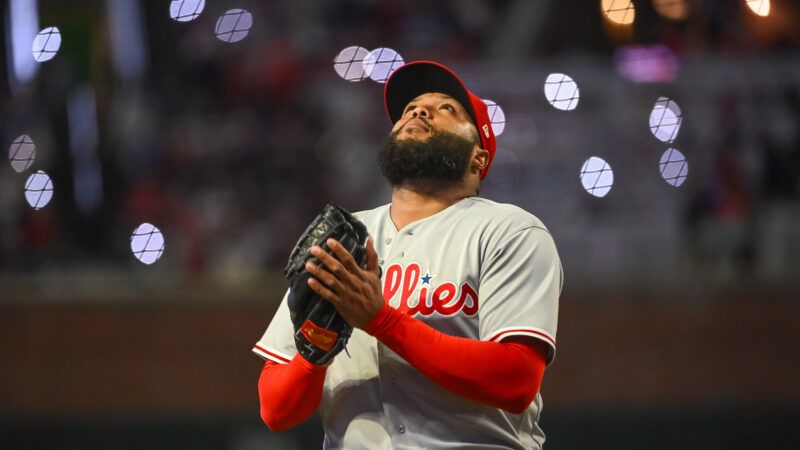A Philadelphia Phillies Player's Family Is Getting Screwed by the Immigration System
If multimillionaire José Alvarado can't figure out how to get his family here, what hope do other Venezuelan migrants have?

During the MLB playoffs, when someone hits a home run or pitches a strikeout, he often looks to his family in the stands to celebrate. Philadelphia Phillies' Nick Castellanos' son, Liam, is practically part of the team since the camera pans to his reaction every time his dad hits a home run. But relief pitcher José Alvarado has thrown 82 pitches so far this postseason for the Phillies—and his mother and children haven't been able to see a single one. And the United States' immigration system is to blame.
Born in Maracaibo, Venezuela, Alvarado dropped out of school at age 14 to help his family manage their farm. He originally took a liking to soccer, but, left-handed, he learned he had an advantage as a baseball pitcher. Alvarado made his MLB debut in 2017 with the Tampa Bay Rays and was traded to the Phillies in 2020. That year was the last time he was able to hug his children. His mother and two of his three children had visas that expired in 2020.
"It's a lot of pressure," Alvarado told The Philadelphia Inquirer. "I want to help. I worry about her, I worry about my kids. I just want to be with my family."
The visa renewal process for Venezuelans (or any immigrants, for that matter) is in no way, shape, or form simple—even when you have all the resources of a professional athlete at your fingertips. Back in 2019, the U.S withdrew diplomatic personnel from the embassy in Caracas. To make matters worse, Venezuela is designated as a "Level 4: Do Not Travel" country by the State Department because of "crime, civil unrest, kidnapping, and the arbitrary enforcement of local laws."
This means that Alvarado's family would need to travel to another country's embassy in order to obtain new visas. First, they tried the U.S. embassy in Colombia and were denied. Then Alvarado paid for them to travel to Brazil, where they were denied again. Alvarado's family is blessed to have resources—but most immigrants wishing to come to the U.S. don't have the ability to travel to multiple countries and pay thousands of dollars to apply for visas just to get denied.
The Biden administration continues to try to address the record number of Venezuelans wanting to enter the U.S. in a variety of ways, but it hasn't been enough. Earlier this year, the administration launched a program to allow Venezuelans to fly into the country legally if they had an American sponsor. Cubans, Haitians, and Nicaraguans have since been added to that program—but, unfortunately, it caps out at 30,000 people per month. That's simply not enough.
Recently some international players have even asked to leave professional teams because they can't find a way to get their families into the United States. If it is this hard for professional athletes' families to get into the U.S., there's little hope for immigrants who don't have access to such tremendous resources. Hopefully Alvarado's family can obtain visas in time to see him become one of the best closers in baseball—a monumental accomplishment that deserves to be celebrated with loved ones.


Show Comments (86)